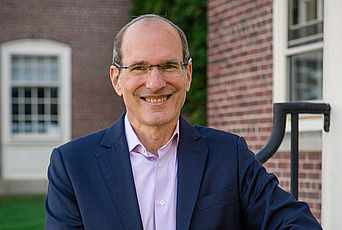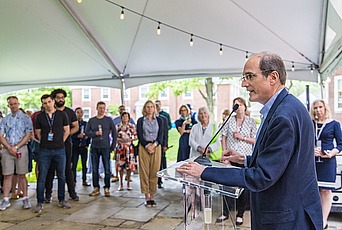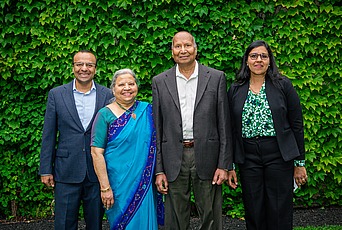A Word from Nirenberg
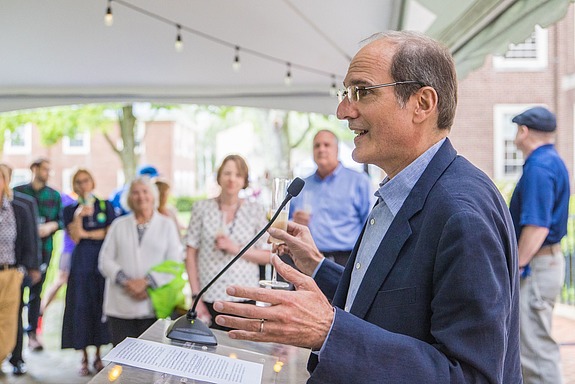
On May 20, 2022, IAS celebrated Founders Day in recognition of Louis Bamberger and Caroline Bamberger Fuld, the brother and sister who founded and endowed IAS on May 20, 1930, providing for its lasting and essential independence. The event, held on campus, began with a toast from Director and Leon Levy Professor David Nirenberg, after which the Friends held their Annual Meeting, and Staff, Members, Faculty, the Director, and a Trustee played in the third annual flag football game. Hardly deterred by a brief thunderstorm and downpour, the event continued with food trucks, a community dinner, and an evening of dancing in Simons Hall. Before joining the flag football game, Nirenberg opened the Friends Annual Meeting, sharing some thoughts about the value of the Institute and the Friends’ support of its work.
The following is adapted from his remarks to the Friends:
It’s such a pleasure to be here at my first Friends Annual meeting. Perhaps because I am in my infancy as Director of this marvelous institution, I find myself musing about the world into which IAS was born. It was a world of economic collapse and uncertainty. It was a world of sharp and legal discrimination along the lines of race, religion, and gender. It was a world of change in the technologies of communication—radio and cinema—that in turn transformed the possibilities of politics. Just think of those pictures of Roosevelt in front of a bank of microphones, or of Hitler’s propaganda films. It was a world of ideology and nationalism, and the rising flames of war. In the more local neighborhood of universities and research institutions, it was a time of sharp debate about what could and should be taught, and who should teach it.
In some ways that world feels uncomfortably like our own: a time in which we see the re-emergence of borders; new barriers to the exchange of people and ideas; a rekindling of war and mass migration; and renewed conflict over the nature of universities, of research and of expertise. What we today call the culture wars.
Given the similarities, it is worth asking ourselves how the infant Institute navigated the complexities of the world in which it was founded. Here’s one example: at a time when discrimination was not only legal but extensively practiced in the U.S. and many other areas of the world, the Institute’s founders insisted that it was “fundamental to our purpose” that there be no discrimination on the basis of race, religion, or sex. The goal of excellence, the Bambergers felt, demanded the inclusion of talent, regardless of origin.
The infant IAS lived by those ideals at a time when it was not easy to do so. It is an accident of history that our first and most famous Faculty member was also the world’s most famous refugee. But what began as accident soon became concerted strategy. Nor were refugees the only targets of inclusion at the Institute. The Institute worked to remove Japanese scientists from internment camps and bring them to Princeton. It welcomed women among its Faculty and Members at a time when the same could not be said of many institutions of higher learning. And it welcomed African Americans like the mathematician David Blackwell while they were barred from many other places.
Enacting these values was not easy, and it wasn’t without conflict. Abraham Flexner, the Founding Director, worried that too many refugees would crowd out American scientists, and he was constantly fretting that the activities of Einstein and others would excessively politicize the Institute. But despite disagreement, the Institute became the example of what it means to be a refuge for the world’s scholars in times of crisis.
There were many other questions debated in the early years of the Institute, including that of campus and environment. Again, we should not imagine agreement. If it were up to Flexner, for example, the Institute would not have had a campus, let alone the verdant island we inhabit. Others, like Veblen and Aydelotte, thought of field and forest as a crucial context for thought.
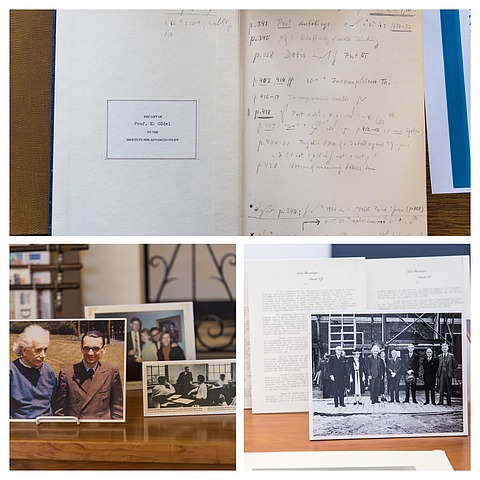
And what about the intellectual environment? What kinds of research should the Institute foster, what kinds of conversations should it catalyze? These too are questions that have been debated ever since the Institute was founded. We often refer to one of Flexner’s contributions to that debate, the “Usefulness of Useless Knowledge.” That essay’s lesson was not—as is sometimes asserted—that the Institute should avoid any research that is useful or has application. Its point was the much more subtle one, reinforced over and over again across our history, that it is neither easy nor advisable to draw too clear a line between theory and application.
Kurt Gödel, for example, may seem to dwell in the realm of pure theory— or perhaps not even in this world, some who knew him might have thought— but in his last letter to his dying colleague John von Neumann, he proposed the computational possibility of automating mathematical proofs. This was an early statement of what we today call the P versus NP problem, with implications for any number of applications, such as the cryptographic techniques upon which the protection of all of our data depends.
My point thus far is a simple one. The inhabitants of this Institute have often disagreed in their debates about how best to offer knowledge to an ever-changing world. But on one thing they have always agreed: the value of debate itself. The founders thought a great deal, not only about what we today call free speech and academic freedom, but also about cultivating what we today call “viewpoint diversity,” so that there could be a real testing of ideas, rather than ideological or disciplinary consensus. Flexner even proposed that the Institute should go out and hire the best Bolshevik economist it could find, since ideas are tested through disagreement. I wonder what economics department today would countenance such a radical idea?
Throughout all of these debates, the goal was to create at the Institute a collection of thinkers capable of producing—through their talent, proximity, collaboration, disagreement, and conversation—insights and discoveries that could not otherwise have been produced.
Gathered as we are here today in festivity, it is easy to forget that institutions dedicated to discovery and to the free transmission of knowledge cannot be taken for granted. They have been absent in many periods of human history, and even today, they are threatened in or absent from large parts of the world. Institutions such as ours are rare. And they are fragile. They require the extraordinary support of extraordinary people like you, our Friends.
Though I have only been at IAS for a few months, that is more than sufficient time to recognize the many ways in which Friends contribute to IAS. Thank you for being among our best ambassadors, volunteers, and partners in welcoming IAS Members and families to the Princeton community. Thank you for your philanthropy—in the etymological sense of your love of humanity—which has so often sustained us, and especially through the dark years of the pandemic. Thank you on this Founders Day for your friendship, without which our Institute, and our world, would be much impoverished.
